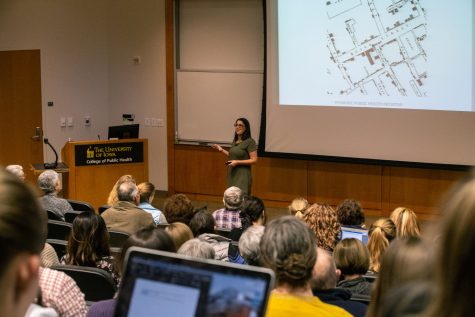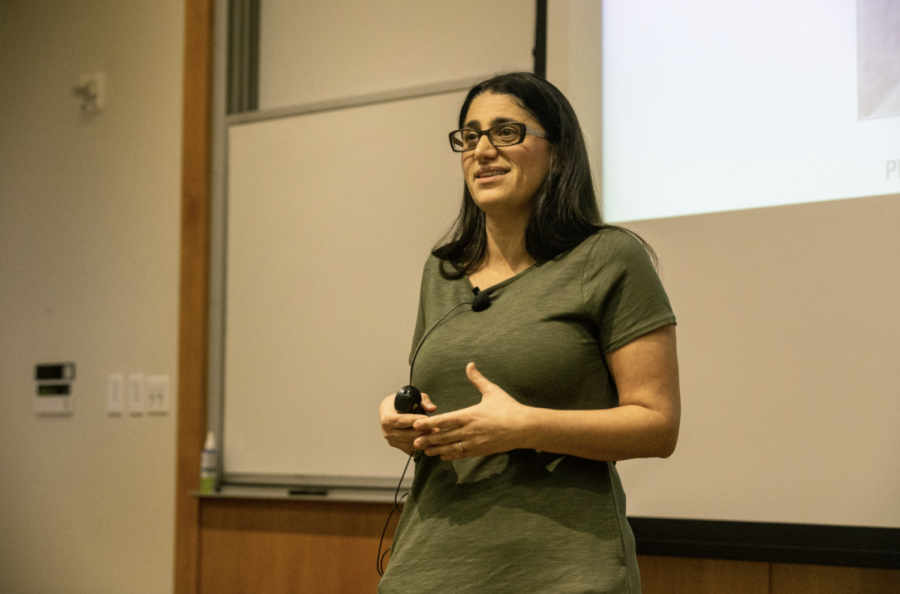College of Public Health hosts book club, invites authors to UI, gives free copies to department
The UI College of Public Health hosts an annual book club. This year, Mona Hanna-Attisha’s What the Eyes Don’t See: A Story of Crisis, Resistance, and Hope in an American City was chosen, a book about the Flint water crisis. The college provided 500 free books for students, staff, and faculty to encourage participation and inclusion.
Doctor Mona Hanna-Attisha speaks during an event for the University of Iowa College of Public Health’s Book Club at the College of Public Health on Monday, March 25, 2019. Doctor Mona spoke about her experiences exposing the water crisis in Flint, Michigan. The New York Times named Doctor Mona’s book “What the Eyes Don’t See” one of the 100 most notable books of the year in 2018.
April 9, 2019
One college. One book. One author. One academic year.
The University of Iowa College of Public Health’s annual book club allows students, staff, and faculty to collaboratively read one nonfiction book related to a current public-health issue annually.
This year, the college chose Mona Hanna-Attisha’s What the Eyes Don’t See: A Story of Crisis, Resistance, and Hope in an American City. Hanna-Attisha’s book covers the water crisis in Flint, Michigan. This was a perfect choice because it aligns with the UI’s theme semester, “American Dream,” said Dan McMillan, strategic communications director in the Public Health College.
Hanna-Attisha spoke at the UI in March, and two UI undergraduate students, Autumn Moen and Anna Correa, hosted a book talk with her beforehand. They were invited by their academic adviser, and Correa was only a couple months into her first semester at the UI when she agreed.
RELATED: UI College of Public Health dean leads collaborative workshop between U.S., India
“The faculty and staff at the College of Public Health are great,” Correa said. “Any faculty or staff member could have been up there moderating the discussion, but they chose to give that opportunity to students.”
The college provided 500 free copies of What the Eyes Don’t See to distribute through their academic departments, students, and the public health Living and Learning Community for first-year undergraduates. They will evaluate funds and feedback to determine if they will continue providing free copies of book-club picks in coming years, McMillan said.

Mona Hanna-Attisha speaks during an event for the University of Iowa College of Public Health’s Book Club March 25. Hanna-Attisha spoke about her experience exposing the water crisis in Flint, Michigan. The New York Times named Hanna-Attisha’s book What the Eyes Don’t See one of the 100 most notable books of the year in 2018.
“I don’t know if I would have read the book if I had not been given it,” Moen said. “Having the opportunity to read book in our field and area of interest for free was great. Everyone reading it at once allowed for conversation and connection to things we learned in the classroom.”
In 2013, the Public Health College collaborated with the Iowa City Book Festival to host a community event featuring The Immortal Life of Henrietta Lacks by Rebecca Skloot with various members of the Lacks family in attendance, McMillan said. The excitement over this event inspired the college to start what is now the annual book club.
“We saw that reading a common book was a terrific way to promote a sense of community among our students, faculty, staff, and others interested in public health,” McMillan said. “We discovered that alumni and community members were very interested as well. It also provided an opportunity for people outside the field of public health to think about a topic from a public-health perspective and perhaps understand public health in a more personal way.”
Six years later, the college has brought such authors as Jonathan Katz and Matthew Desmond to speak about their books. The college evaluates which book is chosen by recommendations, current and important issues, or if an author is promoting the book by touring and the topic is relevant, McMillan said.
RELATED: Activist, pediatrician visited the UI to address the Flint public health disaster
Next year’s book will likely be chosen late this summer or early next fall, McMillan said.
“It’s another opportunity for our students, faculty, staff, and others in the community to hear from someone who’s writing about a public-health topic and putting it in a contemporary context,” he said. “It’s helpful for other faculty, staff, and students to hear a person from outside the academic environment talk about public health in a way that reflects back to us.”



